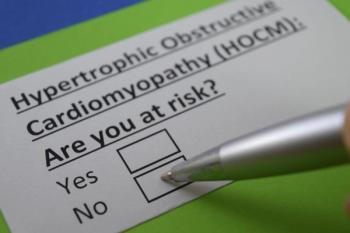
Inclisiran Monotherapy Significantly Reduces LDL-C in ASCVD
Additional data will be presented at a scientific meeting later this year.
The phase 3 V-MONO study of inclisiran (Leqvio) met its primary endpoints, Novartis has announced. Monotherapy with the drug resulted in both clinically meaningful and statistically significant low-density lipoprotein cholesterol (LDL-C) lowering compared with both placebo and ezetimibe therapy in patients not receiving lipid lowering therapy who were at low or moderate risk of developing atherosclerotic
Inclisiran is a small interfering RNA (siRNA) that first received FDA approval in December 2021 as the first and only siRNA therapy to lower LDL-C with just 2 doses per year, following the initial dose and an additional dose at 3 months.2
V-MONO (
Data from the V-MONO study will be shared with regulatory agencies, including the FDA, and will be presented at an upcoming medical meeting.
READ MORE:
Earlier this year, Novartis shared data from V-INITIATE (
Safety results were consistent with data from ORION-3 (
Both trials are part of the VictORION clinical trial program, described as “one of the largest clinical trial programs of its kind.” More than 60,000 patients across 50 countries are enrolled in more than 30 clinical trials. The goal of VictORION is to “expand the foundational evidence of LDL-C reduction with Leqvio in diverse patient populations” via randomized clinical trials, implementation research, real-world evidence, and primary and secondary prevention trials evaluating cardiovascular outcomes. Additional studies include ORION-4 (
Per Novartis, VICTORION-1-PREVENT “is the only dedicated study of a nonstatin lipid-lowering therapy in a high-risk primary prevention population” as defined by guidelines from the American College of Cardiology and the American Heart Association. Enrollment for VICTORION-1-PREVENT is anticipated to be completed later in 2024. Data readouts for the ORION-4 and VICTORION-2-PREVENT outcomes studies are anticipated in 2026 and 2027, respectively.
“We are proud that we continue to advance the scientific understanding of using siRNA therapy to tackle one of the world’s biggest health care challenges, as too many people still struggle to reach their cholesterol goals,” said Shreeram Aradhye, MD, president, development and chief medical officer at Novartis. “This trial adds to the growing body of evidence for Leqvio across the full spectrum of ASCVD as we strive to help more patients in need.”
Globally, millions are affected by cardiovascular disease, with more associated deaths than cancer, chronic lung disease, and diabetes combined. ASVCD is responsible for 85% of all cardiovascular deaths, and the disease represents a greater burden than any other chronic disease in the US.
READ MORE:
References
Novartis twice-yearly Leqvio demonstrated clinically meaningful, statistically significant LDL-C lowering as a monotherapy in patients at low or moderate ASCVD risk. News release. Novartis. August 28, 2024. Accessed August 28, 2024.
https://www.novartis.com/news/media-releases/novartis-twice-yearly-leqvio-demonstrated-clinically-meaningful-statistically-significant-ldl-c-lowering-monotherapy-patients-low-or-moderate-ascvd-risk FDA approves Novartis Leqvio (inclisiran), first-in-class siRNA to lower cholesterol and keep it low with two doses a year. News release. Novartis. December 22, 2021. Accessed August 28, 2024.
https://www.novartis.com/news/media-releases/fda-approves-novartis-leqvio-inclisiran-first-class-sirna-lower-cholesterol-and-keep-it-low-two-doses-year New Novartis data show early addition of twice-yearly Leqvio (inclisiran) following maximally tolerated statin therapy significantly reduces LDL-C in ASCVD patients in real-world setting. News release. Novartis. April 6, 2024. Accessed August 28, 2024.
https://www.novartis.com/news/media-releases/new-novartis-data-show-early-addition-twice-yearly-leqvio-inclisiran-following-maximally-tolerated-statin-therapy-significantly-reduces-ldl-c-ascvd-patients-real-world-setting
Newsletter
Pharmacy practice is always changing. Stay ahead of the curve with the Drug Topics newsletter and get the latest drug information, industry trends, and patient care tips.























